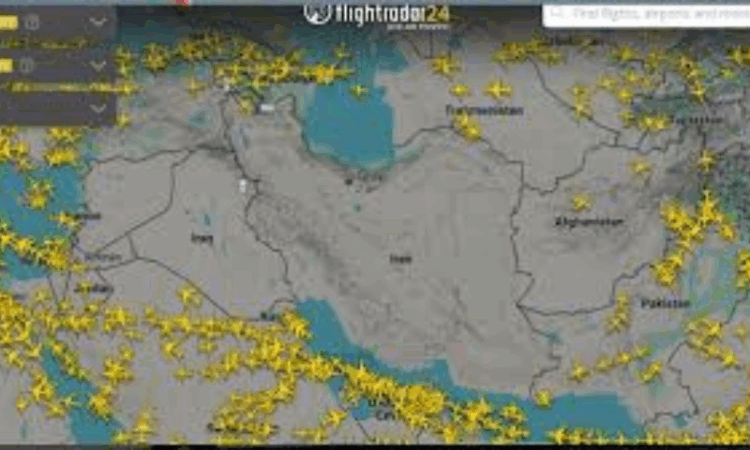Tehran, June 13, 2025: Commercial air travel across the Middle East faced widespread disruption on Friday after Israel launched a series of airstrikes on Iranian territory, prompting the closure of key airspaces and the suspension or diversion of numerous flights.
According to real-time data from Flightradar24, airlines began vacating the skies over Israel, Iran, Iraq, and Jordan shortly after the attacks began, with carriers scrambling to ensure the safety of passengers and crew.
- Iranian airspace was officially closed “until further notice,” state media reported, following Israeli attacks that targeted nuclear facilities, ballistic missile sites, and military commanders. Iran maintains that its nuclear program is peaceful and condemned the strikes as a violation of international law.
- Israel’s Ben Gurion International Airport in Tel Aviv was also closed indefinitely. National carrier El Al Airlines suspended all flights to and from Israel.
- Iraq shut down its airspace and suspended all flight operations across its airports early Friday, affecting one of the world’s busiest corridors for East-West aviation.
- Jordan, situated between Israel and Iraq, also closed its airspace a few hours after the first Israeli strikes.
“The situation is still emerging—operators should use a high degree of caution in the region at this time,” said Safe Airspace, a risk advisory platform operated by aviation group OPSGROUP.
Several international airlines promptly rerouted or grounded flights:
- Air India diverted or returned multiple long-haul flights, including those from New York, Vancouver, Chicago, and London, all of which usually traverse Iranian airspace.
- Lufthansa Group suspended all flights to Tehran and announced it would avoid Iranian, Iraqi, and Israeli airspace for the foreseeable future.
- Qatar Airways cancelled flights to and from both Iran and Iraq, citing regional airspace closures.
- Wizz Air Abu Dhabi and Emirates Airlines announced cancellations on routes to Iraq, Jordan, Lebanon, and Iran, while flydubai suspended services to Amman, Beirut, Damascus, Iran, and Israel.
- Aegean Airlines cancelled all scheduled flights to Tel Aviv for June 13, while Aeroflot called off its flights between Moscow and Tehran and rerouted others in the region.
- Turkish Airlines’ subsidiary AJet suspended flights to Iran, Iraq, and Jordan through Monday, while continuing daylight operations to Lebanon via adjusted routing.
At major Gulf hubs, Abu Dhabi Airport warned of widespread flight disruptions and advised passengers to check with their airlines for updates. In Dubai, delays and cancellations were reported at both international terminals, as air traffic controllers responded to shifting regional airspace restrictions.
Flight tracking data showed commercial aircraft diverting over Central Asia and Saudi Arabia to bypass the affected zones.
The airspace shutdowns come amid escalating regional tensions following Israel’s strikes, which it claims are aimed at halting Iran’s nuclear ambitions. Iran has denied pursuing nuclear weapons and vowed retaliation, raising fears of a broader military conflict in the region.
As the situation unfolds, global aviation authorities and airlines remain on high alert, closely monitoring developments and adjusting operations to ensure safety.








